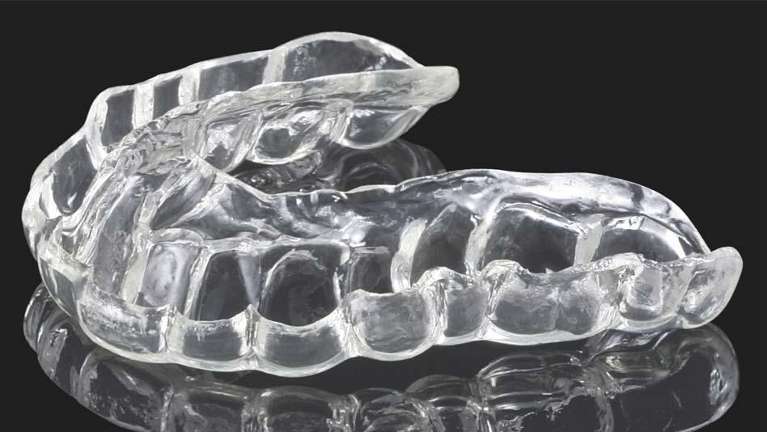
TMJ Treatment
TMJ, or Temporomandibular Joint disorder, is a common condition that affects the jaw joint and surrounding muscles. It can cause various symptoms, including jaw pain, headaches, ringing in the ears, and difficulty biting or chewing. If left untreated, TMJ can have serious consequences for your oral health and even your overall quality of life. So, let's explore the causes and symptoms of TMJ, the consequences of ignoring it, and the solutions available to you through dentistry.
What causes TMJ Dysfunction?
Think of your jaw as a well-oiled machine, with the temporomandibular joint (TMJ) as the crucial hinge that connects the lower jaw to the skull. Just like the hinge on a door, the TMJ allows you to open and close your jaw smoothly. But if the hinge becomes damaged or worn, it can cause the door to stick or make a loud noise every time it opens and closes. Similarly, a damaged or worn TMJ can cause difficulty in jaw movements, result in clicking sounds and, consequently, pain.
There are many potential causes of TMJ dysfunction, including:
- Teeth grinding (bruxism)
- Arthritis
- Jaw injury
- Stress
Stress is a particularly is a common trigger for TMJ, as it can cause you to clench your jaw or grind your teeth. This puts a lot of strain on the TMJ, leading to pain and other symptoms.
Common Temporomandibular Joint Dysfunction Symptoms
The symptoms of TMJ can be subtle at first, but they can quickly become more pronounced if left untreated. Common symptoms include:
- Pain or tenderness in the jaw
- A popping or clicking sound when you open and close your mouth
- Difficulty biting and chewing
- Jaw locking (inability to open or close the mouth)
- Headaches and neck pain
- Ringing in the ears (tinnitus)
Ignoring the symptoms of TMJ can have serious consequences in the long term. If left untreated, the condition can progress and lead to:
- Chronic pain and discomfort
- Increased risk of tooth decay and gum disease
- Difficulty eating and speaking
- Sleep disturbances
- Depression and anxiety
Just like a machine, if the hinge on your jaw isn't functioning properly, the rest of the machine (i.e. your jaw and surrounding muscles) can become strained and fatigued. This can lead to a cascade of problems that can have a significant impact on your quality of life.
What are the TMJ Treatment Options?
Fortunately, there are multiple solutions available to those suffering from the discomfort of a TMJ disorder via dentistry. These most commonly include:
Orthodontics
If your TMJ is caused by bite problems, e.g. an improper bite or crooked teeth, then an orthodontic treatment may be recommended. Braces or clear aligners can be used to straighten the teeth and improve the bite, thereby reducing the strain on the jaw and reducing symptoms of TMJ.
Bite splints or night guards
If you grind your teeth at night (bruxism), your dentist may recommend a bite splint or night guard. This is a custom-fitted appliance that fits over your teeth and helps to prevent grinding and clenching while you sleep. By reducing the strain on the TMJ, bite splints and night guards can help to relieve symptoms of a TMJ dysfunction.
Botox injections
In some cases, Botox injections may be used to relax the muscles that control the jaw and relieve tension in the TMJ. This can be especially helpful for those who clench their jaw or grind their teeth due to stress.
Oral surgery
In severe cases of TMJ, oral surgery may be necessary to correct the jaw joint and relieve pain.
Receive Quality Care at Paddington Dentistry
Generally speaking, as a dental condition, TMJ can be effectively managed by dentists, for they can provide a range of solutions, ranging from orthodontics to Botox injections, that help relieve symptoms of TMJ and improve your quality of life. Hence, if you're experiencing symptoms of TMJ, don't wait to seek treatment. By working closely with one of our experienced dentists at Paddington Dentistry, you can find the relief you need and get back to doing the things you love.
Book a consultation today
If you're experiencing any TMJ symptoms or would like to know more about TMJ dysfunction, contact Paddington Dentistry to book an appointment. We look forward to providing you the necessary advanced dental care and support you need.
Meet Our Doctor:

Dr Nick Nabavi BDS , MRACDS
Dr Nick Nabavi enjoys providing a pleasant, stress-free experience for all of his patients. As the principal dentist of Paddington Dentistry, he aims for building lasting relationships with every patient he treats, and this is something he is proud of. His focus is preventive and minimally invasive dentistry, and he aims to achieve beautiful, healthy smiles with a conservative and holistic approach.
Nick obtained his qualification in Bachelor of Dental Surgery (BDS) from Brisbane in 2009 and his Membership of Royal Australasian College of Dental Surgeons (MRACDS) from Sydney in 2016. He regularly ...
Featured Blog Posts - TMJ Treatment
OCCLUSAL SPLINT INSTRUCTIONS

WHAT ARE OCCLUSAL SPLINTS FOR?
An occlusal splint is a removable appliance made of acrylic /resin that covers all the biting surfaces of upper or lower teeth.
It is indicated for patients who have jaw/muscle pain or headaches; temporomandibular disorders (TMD) or patients who display excessive wear of their teeth from clenching or grinding(bruxism).
It will allow the jaw to find its best position because the splint prevents the teeth from locking together, which reduces the load on jaw muscles & teeth.
THE ADVANTAGES OF AN OCCLUSAL SPLINT ADJUSTMENT
Protects natural teeth from further ...
All About Bruxism and Teeth Grinding
